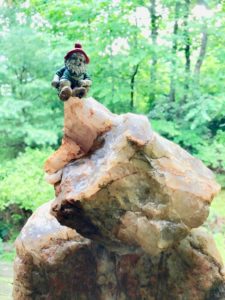
– Photo by Jan Ketchel
Is it diabolical that a mosquito, tick, bacteria, or virus feeds upon the matter and substance of our physical bodies? A nuisance, and in some cases a lethal nuisance indeed, yet, we begrudgingly accept this negative symbiotic reality as a feature of our physical world.
The Shamans of Ancient Mexico concur that our universe is a predatory universe. They describe this dynamic as operational at an even more subtle energetic level as well, that of an inorganic yet living entity that feeds upon the human energy produced by human emotion. Although negative in its draining of human energy, it also serves as a teacher that helps humans evolutionarily advance, if they can learn how to master its parasitic onslaught.
This opportunity, and the need for mastery over it, is ever so obvious in the conditions of our current world predicament. Outwardly, we are bombarded daily with the most outrageous of words and behaviors, incessantly taxing our emotional reserves, resulting in extreme volatility and emotional exhaustion.
These onslaughts fill the airwaves and social media, captivating modern life. Closer to home, beyond the politics of now, are our own personal longings for attention and validation, our own deepest needs compulsively seeking to bind us to screens.
Inwardly, we too are prey to the promptings of self-importance and self-pity, seeking outlet in an upward spiral of ecstatic inflation, or in a downward vortex, sending us into a bottomless pit of tortured longing and sadness. These volatile tendencies within ourselves often manifest in cycles of addictive attachments.
Shamans maintain that these various pathways of emotional activation are generated by an inorganic entity, which they have dubbed the flyer, through the judgments of offense that our internal dialogue incessantly broadcasts. Those judgements are directed toward self and other. They, in turn, generate a wave of emotional energy, the food for the flyer.
To free the self of this depleting symbiotic trap, shamans recommend a furtive effort of detachment, which they call the warrior’s way. The goal of the warrior’s way is to gain freedom from the bindings of attachment, first and foremost to being offended. If one can remain sober and detached in the face of offensive words and behaviors, none of one’s energy is lost in the encounter.
To accomplish this, one must lose one’s attachment to self-importance. Self-importance is generally garnered through validation by others, a highly dependent and vulnerable position, which leads to endless emotional strife. Rather than turn over one’s power to another’s validation, the guidance is to face the truth of one’s self within. Acceptance of, and the ability to laugh at, one’s self, goes a long way in cancelling out the impact of the judgments of others.
Self-esteem becomes acceptance of the whole truth of one’s actual self, good and bad. Inappropriate behavior by others is properly placed as their problem to face and resolve, and not as offense to one’s own self. This does not mean that we don’t strategically decide how to manage inappropriate behavior, however, we do so with truthful sobriety rather than with offense.
Freed of the emotional activation generated by judgments within and without, we advance in maturity. We accrue the energy that grants us the power to act decisively, with precision. No energy is wasted in feeding the predator. The predator is defeated when we deny it the energy of our emotional disgust and defeat.
In this time of flagrant predatory human behavior, we are all offered the opportunity to advance beyond the narcissistic emotional web of the predator, who constantly stirs up and then feeds upon our emotional turmoil. We don’t have to keep playing that game.
I prefer to punctuate the positive opportunity of this seemingly depressed and depressing time. I envision the predator as our ultimate teacher.
The predator, as teacher, shines the spotlight upon our attachment to self-importance, showing us the emotional trap where the greatest work needs to be done, and where the largest storehouse of our energy lies, waiting to be retrieved. Once we close this emotional trap drain, we open ourselves to a whole new world of freedom. Freedom to be.
Being,
Chuck


